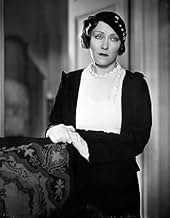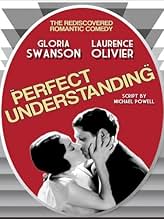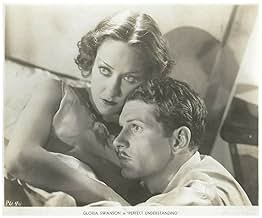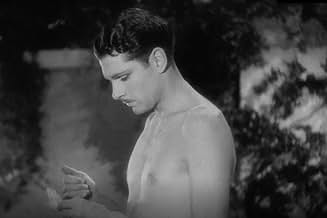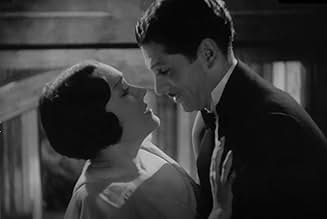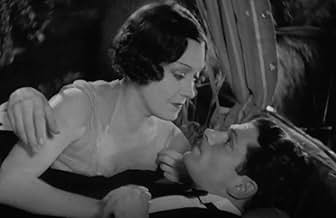अपनी भाषा में प्लॉट जोड़ेंA young couple decide to marry under the condition that they agree never to disagree. That agreement is soon put to the test when the husband finds himself attracted to a beautiful young wom... सभी पढ़ेंA young couple decide to marry under the condition that they agree never to disagree. That agreement is soon put to the test when the husband finds himself attracted to a beautiful young woman.A young couple decide to marry under the condition that they agree never to disagree. That agreement is soon put to the test when the husband finds himself attracted to a beautiful young woman.
Evalyn Bostock
- Maid
- (बिना क्रेडिट के)
Syd Crossley
- Butler
- (बिना क्रेडिट के)
फ़ीचर्ड समीक्षाएं
Perfect Understanding (1933)
* 1/2 (out of 4)
With her star quality fading, Gloria Swanson went to England to produce this melodrama, which when released would just harm her career even more as it failed with both fans and critics. Judy (Swanson) and Nicholas (Laurence Olivier) agree to get married with the "perfect understanding" that they never argue or disagree. All goes as planned until Nicholas takes a trip to Cannes where he falls for another woman. PERFECT UNDERSTANDING is the perfect example of legends doing an awful film. There's really no doubt about it but this thing is just deadly dull from the word go and it never picks up any steam. It's easy to see why the movie was such a disaster when it was originally released but the most confusing thing is why Swanson decided to produce this herself and in England. I mean, this type of melodrama was flowing from every small and major studio in America so going to England really didn't do anything to improve the film. Even worse is that we have so many boring dialogue scenes that just drag everything out that the viewer will be wanting to stick sharp knives in their eyes. Things don't get any better once Olivier does the cheating as we get some pretty boring situations leading to a finale, which is just downright awful. It seems the film wants to return to Swanson's glory silent days because the picture really does look and feel like a silent at times but it's done in such a way that the entire thing just seems old-fashioned and it just doesn't work with the dialogue. Swanson is good in her role but sadly she's not given too much to do. Olivier is excellent in his part but one wishes the great performance was going towards a better cause. PERFECT UNDERSTANDING had pretty much been forgotten for over seven decades until it was brought back up to the surface but sadly, only die-hard fans of the stars should even bother with it.
* 1/2 (out of 4)
With her star quality fading, Gloria Swanson went to England to produce this melodrama, which when released would just harm her career even more as it failed with both fans and critics. Judy (Swanson) and Nicholas (Laurence Olivier) agree to get married with the "perfect understanding" that they never argue or disagree. All goes as planned until Nicholas takes a trip to Cannes where he falls for another woman. PERFECT UNDERSTANDING is the perfect example of legends doing an awful film. There's really no doubt about it but this thing is just deadly dull from the word go and it never picks up any steam. It's easy to see why the movie was such a disaster when it was originally released but the most confusing thing is why Swanson decided to produce this herself and in England. I mean, this type of melodrama was flowing from every small and major studio in America so going to England really didn't do anything to improve the film. Even worse is that we have so many boring dialogue scenes that just drag everything out that the viewer will be wanting to stick sharp knives in their eyes. Things don't get any better once Olivier does the cheating as we get some pretty boring situations leading to a finale, which is just downright awful. It seems the film wants to return to Swanson's glory silent days because the picture really does look and feel like a silent at times but it's done in such a way that the entire thing just seems old-fashioned and it just doesn't work with the dialogue. Swanson is good in her role but sadly she's not given too much to do. Olivier is excellent in his part but one wishes the great performance was going towards a better cause. PERFECT UNDERSTANDING had pretty much been forgotten for over seven decades until it was brought back up to the surface but sadly, only die-hard fans of the stars should even bother with it.
"Perfect Understanding" is a simply dreadful film--very, very dated, dull and filled with folks you really cannot relate to or like. It also features the rather odd romantic pairing of Gloria Swanson and Laurence Oliver--a pairing that doesn't quite work.
The film begins with Swanson singing--something you just don't need to hear unless you are a masochist. Fortunately, Olivier's character didn't love her singing either, though otherwise they play rich folks who have nothing better to do than go to parties, travel the world and talk...a lot. And one of the things they love to talk about is their love for each other. However, Swanson's character is apprehensive to marry, as she's afraid that over time their love will fade. So, they agree to marry and stay married until they begin to argue (ooo, how romantic).
The biggest problem about this film is that it was the Depression and folks were out of work. So, such a mannered and dull film involving the rich and lazy seems strange--and hard to enjoy. The characters seemed rather one-dimensional and annoying. In particular, Swanson's acting didn't help, though Olivier did a nice job in spite of the film's many shortcomings. Dull and probably not worth your time.
The film begins with Swanson singing--something you just don't need to hear unless you are a masochist. Fortunately, Olivier's character didn't love her singing either, though otherwise they play rich folks who have nothing better to do than go to parties, travel the world and talk...a lot. And one of the things they love to talk about is their love for each other. However, Swanson's character is apprehensive to marry, as she's afraid that over time their love will fade. So, they agree to marry and stay married until they begin to argue (ooo, how romantic).
The biggest problem about this film is that it was the Depression and folks were out of work. So, such a mannered and dull film involving the rich and lazy seems strange--and hard to enjoy. The characters seemed rather one-dimensional and annoying. In particular, Swanson's acting didn't help, though Olivier did a nice job in spite of the film's many shortcomings. Dull and probably not worth your time.
Gloria Swanson had formed a film company just to make this film. Unfortunately, this is precisely the type of film that her most famous character, Norma Desmond, likely wanted to make in Sunset Boulevard.
It is really a silent film with dialog replacing the text screens. The actors make grand extravagant gestures, turn their faces to and fro while fluttering their eyelids. The incessant music swells at appropriate moments to indicate high drama. The dialog seems like a nuisance to be summarily added and neglected - after all Swanson had done pretty well for all those years without dialog - why worry about that now.
The quite modern premise of the film, a semi-open marriage, and the conflict brought on by the juxtaposition of the end of the flapper era avant-garde attitudes with the conservative Victorian mores ensconced in the judicial attitude towards divorce should have made the film more interesting that it was.
However, the only real interest and tension is generated by incredible boat race where cocktails are drunk at every station to make the race more difficult! Prohibition was about to be repealed and the celebration of alcohol consumption in such stark contrast to today's attitudes is fascinating.
Tighter editing, better pacing and dialog might have made this worthwhile. As is, it is a curio from the early years of sound, and of interest to the historian and perhaps to the film buff as a primer on the world of Norma Desmond.
It is really a silent film with dialog replacing the text screens. The actors make grand extravagant gestures, turn their faces to and fro while fluttering their eyelids. The incessant music swells at appropriate moments to indicate high drama. The dialog seems like a nuisance to be summarily added and neglected - after all Swanson had done pretty well for all those years without dialog - why worry about that now.
The quite modern premise of the film, a semi-open marriage, and the conflict brought on by the juxtaposition of the end of the flapper era avant-garde attitudes with the conservative Victorian mores ensconced in the judicial attitude towards divorce should have made the film more interesting that it was.
However, the only real interest and tension is generated by incredible boat race where cocktails are drunk at every station to make the race more difficult! Prohibition was about to be repealed and the celebration of alcohol consumption in such stark contrast to today's attitudes is fascinating.
Tighter editing, better pacing and dialog might have made this worthwhile. As is, it is a curio from the early years of sound, and of interest to the historian and perhaps to the film buff as a primer on the world of Norma Desmond.
American expatriate Gloria Swanson is living it up pretty good and meets up with society playboy Laurence Olivier and the two fall in love as it were and get married. But both are used to high living and going their own way. So a Perfect Understanding is reached whereby they do just that and they vow never to quarrel.
Well that's easier said than done. And Larry heads off to the continent and the Riviera as he always does partying hearty. Gloria prepares home and hearth. Larry however has mantrap Nora Swinburne chasing him and when Gloria hears about she rebounds and right there is good old John Halliday to catch her.
Gloria Swanson as it turned out had a great singing voice and at the closing credits gets to sing a song with the rather ungainly title I Love You So Much I Hate You. Good voice, mediocre song, but she probably had it tacked on to a mediocre film for those who remembered her singing Love Your Magic Spell Is Everywhere from The Trespasser.
As for Olivier, up to now I had only seen one of his films before As You Like It. I'm not as hard as he is on himself when he was widely quoted as saying that William Wyler taught him the art of acting on film and that everything he did before Wuthering Heights was garbage. This second one I saw though would validate what he said.
Quite frankly the lives of these society twits got about as much interest from me in the 21st century as it did when it was shown in Depression UK and USA. Word of mouth made the public stay away in droves. And the public is always right.
Well that's easier said than done. And Larry heads off to the continent and the Riviera as he always does partying hearty. Gloria prepares home and hearth. Larry however has mantrap Nora Swinburne chasing him and when Gloria hears about she rebounds and right there is good old John Halliday to catch her.
Gloria Swanson as it turned out had a great singing voice and at the closing credits gets to sing a song with the rather ungainly title I Love You So Much I Hate You. Good voice, mediocre song, but she probably had it tacked on to a mediocre film for those who remembered her singing Love Your Magic Spell Is Everywhere from The Trespasser.
As for Olivier, up to now I had only seen one of his films before As You Like It. I'm not as hard as he is on himself when he was widely quoted as saying that William Wyler taught him the art of acting on film and that everything he did before Wuthering Heights was garbage. This second one I saw though would validate what he said.
Quite frankly the lives of these society twits got about as much interest from me in the 21st century as it did when it was shown in Depression UK and USA. Word of mouth made the public stay away in droves. And the public is always right.
That's the song Gloria sings over the closing credits; the reverse could be emblematic of the film, a trying-to-be-chic trifle that is nonetheless amusing in its stilted sophistication and odd cinematography. Gloria and Olivier swan about modern London--she's an American interior decorator, he appears to be independently wealthy--and do some rather pre-Code making out before deciding to marry. Misunderstandings quickly pile up as each, though nominally terribly terribly in love with each other, contemplate extramarital affairs. There's also intrigue about his suspicion that she's carrying someone else's child--it's far too racy to have been made in the U.S. at the time, and was filmed in Britain by Gloria's production company. The dialogue strains to be Somerset Maugham witty and the supporting cast is nothing special, though Miles Malleson has a nice bit. Gloria is certainly glamorous and good at eye-batting, and Olivier, playing a spoiled bachelor it's hard to root for, has some charm. Also fun is the hilariously overemphatic musical scoring--every comma seems to be accentuated with a crescendo. Not much of a movie, but an interesting look at two stars at uncomfortable times in their film careers.
क्या आपको पता है
- ट्रिवियाMichael Farmer's acting was so bad that, despite being married to the movie's star and main backer Gloria Swanson, he was all but edited out of the movie, giving more screentime to Sir Laurence Olivier.
- भाव
Ivan Ronnson: Jealousy is a wild beast.
- कनेक्शनFeatured in Boulevard! A Hollywood Story (2021)
- साउंडट्रैकI Love You So Much That I Hate You
(uncredited)
Music by Henry Sullivan
Lyrics by Rowland Leigh
Sung by Gloria Swanson
टॉप पसंद
रेटिंग देने के लिए साइन-इन करें और वैयक्तिकृत सुझावों के लिए वॉचलिस्ट करें
विवरण
- चलने की अवधि
- 1 घं 20 मि(80 min)
- रंग
- पक्ष अनुपात
- 1.37 : 1
इस पेज में योगदान दें
किसी बदलाव का सुझाव दें या अनुपलब्ध कॉन्टेंट जोड़ें


